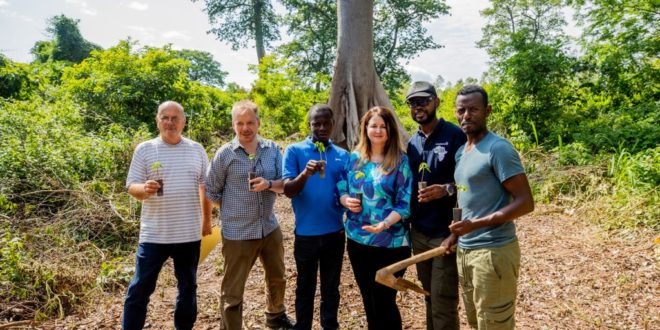[Accra, 01 June 2022] To farmers and their families living in the Bono East Region in central Ghana, the Atebubu and Wiase Forest Landscape Restoration (FLR) Living Lab offers a more resilient food system, greater income and the opportunity to restore nature. The first Circular Bioeconomy Alliance (CBA) Living Lab in Ghana has communities and nature at its heart.
The CBA’s Living Labs for Nature, People and Planet aims to demonstrate how harmony can be achieved by empowering nature and people in a concrete territorial context, integrating traditional knowledge, capitalizing on new research and innovation and based on public-private partnerships. The community-led Atebubu and Wiase Forest Landscape Restoration aims to increase food security through innovative farming methods, and embed regenerative practices that protect the landscape.
Marc Palahi, Circular Bioeconomy Alliance Chair, said: “With the support of AstraZeneca, we have co-designed and are implementing forest actions based on sound scientific evidence and inclusive dialogue, creating public-private-community partnerships to foster ecological and community resilience in central Ghana.”
“The Ghana Living Lab answers the communities’ call to address the challenges they face: deforestation, climate change, declining soil fertility and agricultural productivity, unemployment and frequent forest fires,” explains Abraham Yelley, the Living Lab’s community Liaison Officer, New Generation Plantation Technical Assistance (NGPTA), one of the Living Lab’s implementing partners.
He added, “The Living Lab was co-designed with local communities, local stakeholders and international partners and thanks to AstraZeneca for the funding, the Living Lab supports the aspirations of resilient landscapes and sustainable livelihoods: community upliftment.”
The Living Lab aims to plant 4.5 million trees to restore approximately 2,500 hectares of degraded land through planting indigenous trees for natural forests, promoting agroforestry and regenerative farming across 1,500 hectares through the planting of fruit trees, native trees and smallholder farmer woodlots across 1,000 hectares to grow sustainable timber and wood, to reduce pressure on natural forests, boost productivity and create alternative sustainable livelihoods and sources of income for farmers.
The Living Lab Community Liaison Officers work closely with local communities, creating a network of farmers in each of the 11 communities implementing agroforestry activities and knowledge exchange.
At the same time one of the local partners, Nature and Development Foundation is coordinating a Multi-Stakeholder Platform (MSP) to facilitate engagement with, and between, landowners, land managers, communities, chiefs, civil society, government, and the private sector to discuss progress and to address any concerns in a consultative forum. For example, the Living Lab through the MSP is now addressing the general concern of limited women participation in forestry and is working proactively to engage women and youth as leaders in the MSP, community mobilizers, tree nursery operators, agroforestry champions, and in all activities.
The CBA secretariate, NGPTA, AstraZeneca and other partners visiting the Living Lab this week joined the MSP’s second, well attended meeting.
“The Multi-Stakeholder Platform has created an avenue where both farmers and opinion leaders are brought together to take decisions that benefit themselves, their communities and the environment,” said Anthony Owusu, Bantama, Sene West.
The Living Lab contributes synergies at both local and international levels. With organizations across the globe set to commemorate the Stockholm+50 international meeting and World Environment Day in June 2022 and the Ghana Green Day on 10th June, the Living Lab in Ghana demonstrates concrete action on the ground to help ensure a healthy planet for the prosperity of all. In fact, tree planting is ongoing at the moment in Atebubu and Wiase areas in the lead up to these important days.
Speaking during the visit to the Living Lab, Barbara Nel, President of AstraZeneca’s Africa business in Sub-Saharan Africa, said, “I’m pleased to have been able to meet community leaders, local farmers and other stakeholders involved in this Living Lab and to see firsthand the positive impact. Together we can make a difference. Working with local communities, respecting local knowledge and traditions and merging these with the latest technology and multisectoral expertise is helping to restore local livelihoods and build sustainable communities. AstraZeneca is proud to be able to contribute to this.”
The Living Lab is within AstraZeneca’s AZ Forest initiative to plant and maintain 50 million trees globally by the end of 2025, in partnership with local governments and non-profit organizations. AZ Forest aims to mitigate the negative impacts of climate change and contribute positively to communities, local economies, nature and the planet by building ecological and community resilience.
 Home Of Ghana News Ghana News, Entertainment And More
Home Of Ghana News Ghana News, Entertainment And More





